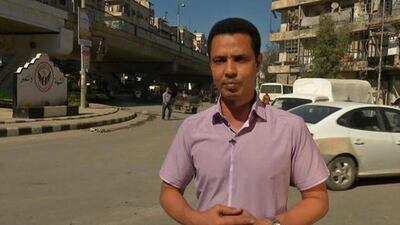BEIRUT // Behind a veil of secrecy, at least 30 journalists have been kidnapped or have disappeared in Syria — held and threatened with death by extremists or taken captive by gangs seeking ransom.
The widespread seizure of journalists is unprecedented, and has been largely unreported by news organisations in the hope that keeping the kidnappings out of public view may help to negotiate the release of those held captive.
The Committee to Protect Journalists says at least 30 journalists are being held and 52 have been killed since Syria’s civil war began in early 2011. The group, based in New York, also has documented at least 24 other journalists who disappeared earlier this year but are now safe. In a report this week, Paris-based Reporters Without Borders cited higher figures, saying at least 60 “news providers” are detained and more than 110 have been killed.
The discrepancy stems from varying definitions of what constitutes a journalist because much of the reporting and news imagery coming out of Syria is not from traditional professional journalists. Some of those taken have been activists affiliated with the local “media offices” that have sprouted up across opposition-held territory.
Only 10 of the international journalists currently held have been identified publicly by their families or news organisations: four French citizens, two Americans, one Jordanian, one Lebanese, one Spaniard and one Mauritanian. The remaining missing are a combination of foreign and Syrian journalists, some of whose names have not been publicly disclosed due to security concerns.
While withholding news of abductions is understandable in many cases, especially with lives at stake, the organisation says, this has also served to mask the extent of the problem.
“Every time a journalist enters Syria, they are effectively rolling the dice on whether they’re going to be abducted or not,” said Jason Stern, a researcher at CPJ.
Extremist groups are believed responsible for most kidnappings since the summer, but government-backed militias, criminal gangs and rebels affiliated with the western-backed Free Syrian Army also have been involved.
“It is vital that journalists witness and tell the story of the Syrian civil war,” said John Daniszewski, senior managing editor for international news at the Associated Press.
The spate of kidnappings has drawn comparisons to Lebanon during its vicious 1975-90 civil war, when westerners, including then-AP Middle East Correspondent Terry Anderson, were taken captive by extremists and held for long periods.
In Iraq, 150 journalists were killed between the US invasion in 2003 and the departure of American troops in 2011 — a rate similar to the CPJ’s figures for Syria — but the numbers of abducted journalists was smaller. Reporters Without Borders said it registered 93 kidnappings of journalists in Iraq from 2003 to 2010 — a far lower rate than it found in Syria. In Libya, a handful of journalists were detained during the war.
Stern said the kidnappings in Syria are unprecedented in scale: “Simply no other country comes close.”
Richard Engel, the chief foreign correspondent for US television network NBC who was kidnapped by pro-Assad militiamen in northern Syrian and held for five days in December 2012, said journalists must reflect long and hard before going to the country.
“Because right now, if you go to into the rebel-held or contested areas in northern and eastern Syria, there is a very sizeable percentage that you’re not going to make it out alive,” he said.
While reporting the uprising has always been a dangerous business, the risk has increased. Early on, President Bashar Al Assad’s government expelled foreign journalists covering anti-government protests. Scores of Syrian journalists were jailed. As rebels began seizing territory, some rebel factions began detaining journalists as well, often on unfounded accusations that they were spies.
Abductions increased significantly in recent months, as extremist groups grew more powerful in some areas.
Most kidnappings since the summer have taken place in rebel-held territories, particularly in chaotic northern and eastern Syria, where militant groups with links to Al Qaeda hold influence.
There are no reliable estimates of how many journalists are held by the government.
Local journalists have taken the brunt of the violence. Of the 52 documented by CPJ as killed, all but five were Syrian. Among the foreigners who lost their lives covering battles were French TV reporter Gilles Jacquier, French photographer Remi Ochlik, American journalist Marie Colvin with Britain’s Sunday Times and Japanese journalist Mika Yamamoto.
Often the cases of abduction are not reported by media organisations at the request of the families or employers.
Peter Bouackert, emergency director at Human Rights Watch, said an unintended consequence of such a blackout is that journalists may be less aware of the dangers they face.
In some cases, rebels acting as middle men have offered to “buy” hostages to use for their own purposes, activists say. Unconfirmed reports say at least some kidnappings are done to raise money for weapons.
In some cases, the captors are thought to be holding hostages for ransom, or as pawns for negotiations.
Bouackert says almost all kidnappings since the summer have involved militants with links to Al Qaeda and remain unresolved with no ransom demands or discussion about releases.
In published accounts of their captivity, some freed journalists wrote of trusted rebels and fixers who betrayed them, and of militant Islamist fighters who psychologically and physically tortured them.
“At first they kept accusing me of being a CIA agent, and to break me pretended to execute me four times. At the end it was all about money,” said Jonathan Alpeyrie, a French-American photographer held in northern Syria for 81 days by militant Islamist rebels until a benefactor paid $450,000 (Dh1.65 million) on his behalf.
Alpeyrie, 34, has reported from Afghanistan, Egypt, Libya, Pakistan and Somalia. He was abducted on his third trip to Syria, apparently betrayed by a fixer. He was freelancing for the New York agency, Polaris Images, when kidnapped.
“I will never go back to Syria,” he said.
Associated Press

